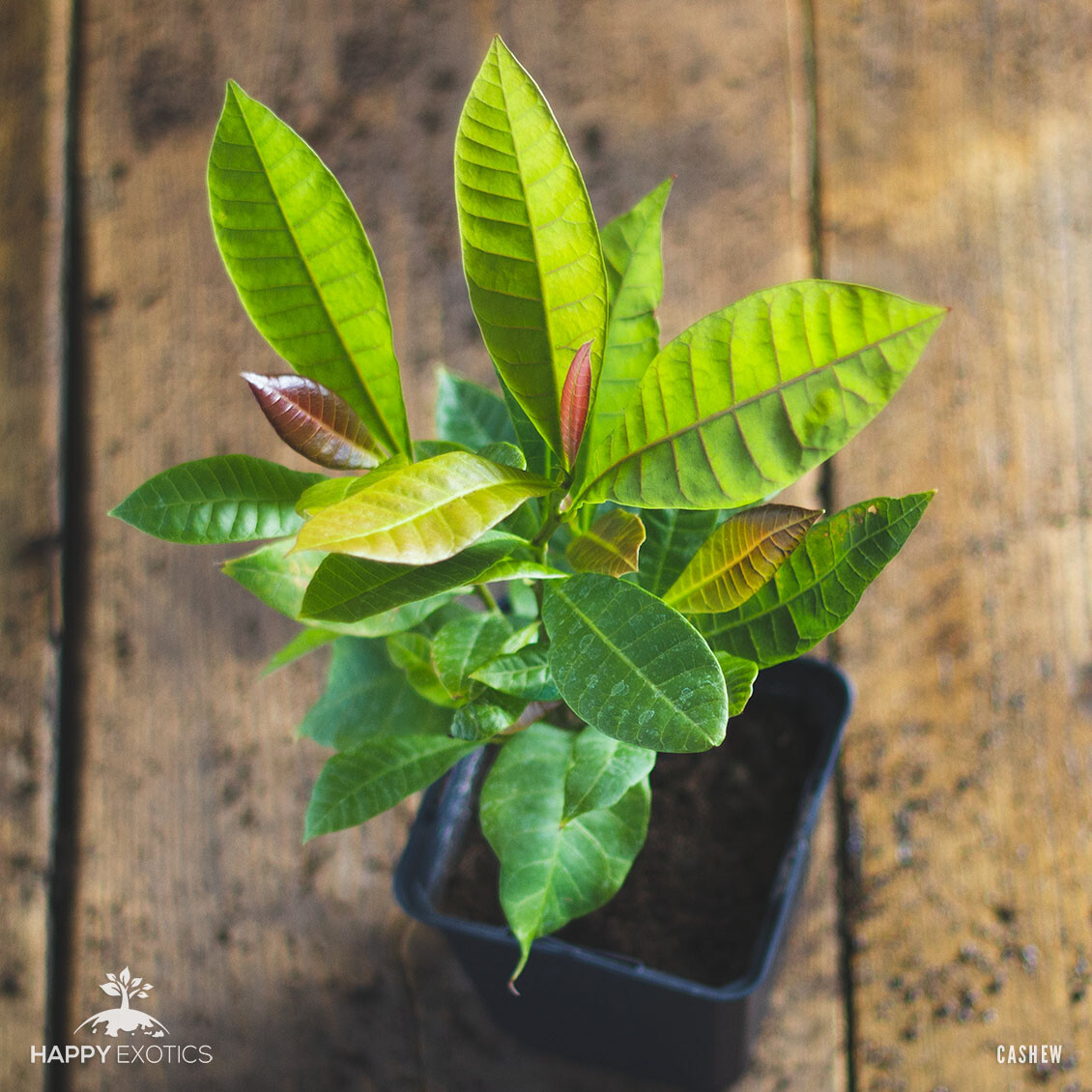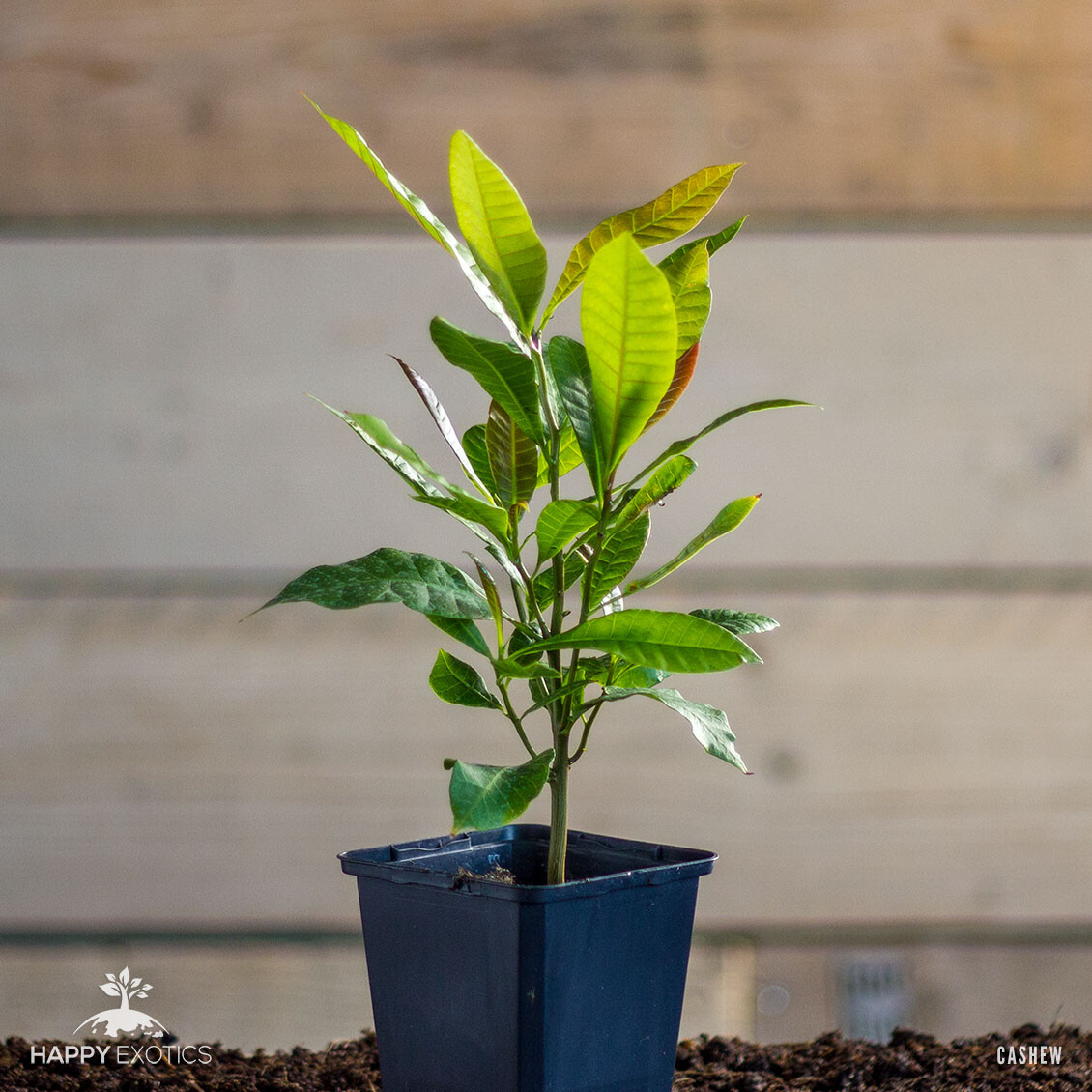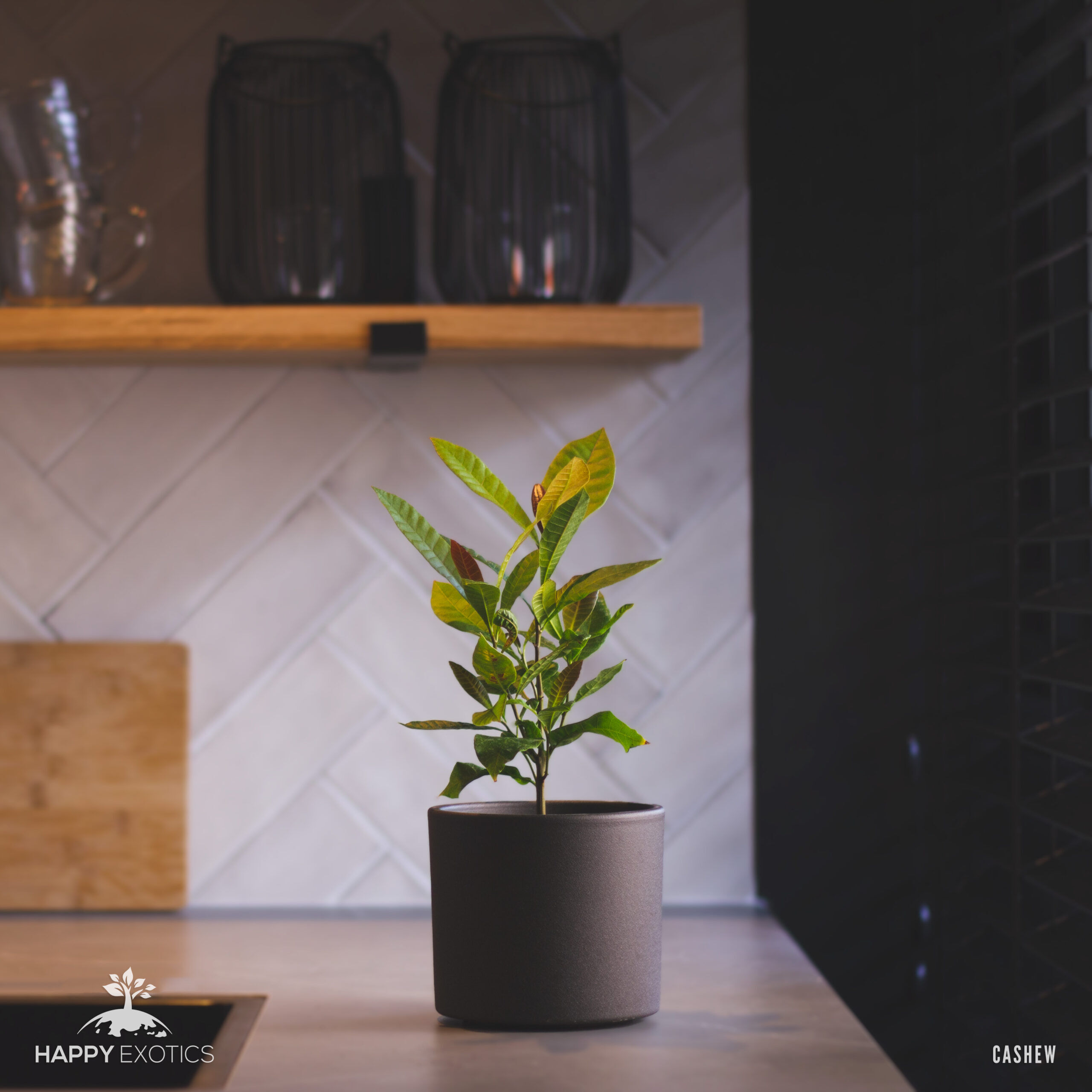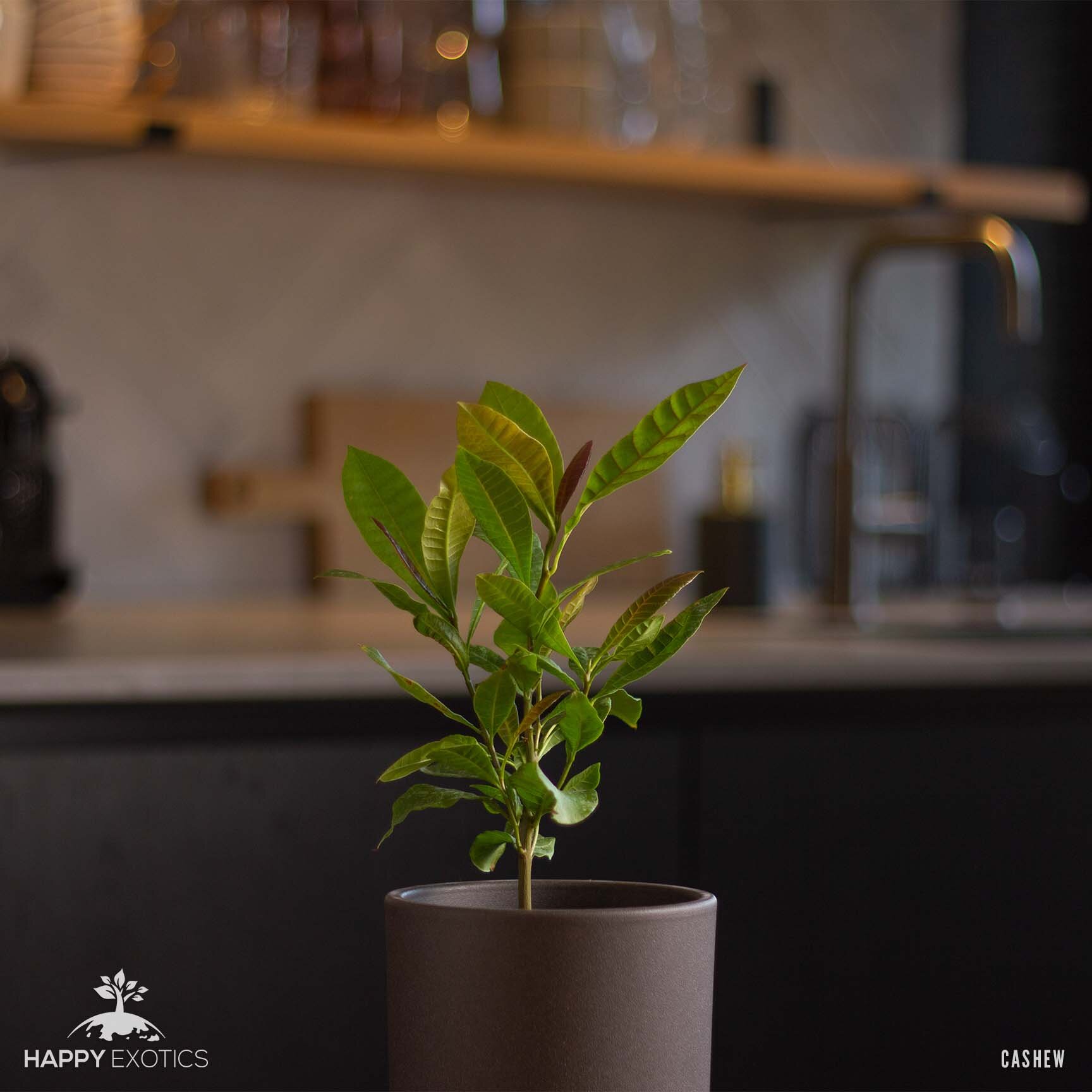1 super happy Cashew tree Kaju plant – Anacardium occidentale
€22.95
Out of stock
Email when stock available

Fast EU shipping

Grown in our own nursery
The cashew tree is an evergreen shrub native to South America and it produces the cashew seed (nut) and cashew apple. It's botanical name is Anacardium occidentale. Its nuts are what made this tree very popular around the world, but more than only the nuts of the cashew tree are being used. It's a tropical tree and very easy to grow.
Cashew tree
Commonly the seeds are called cashew “nuts” though they are not true nuts. The seeds, rich in oil and distinctively flavored, are commonly used in South and Southeast Asian cuisine and are a characteristic ingredient of numerous chicken and vegetarian
dishes of southern India. In Western countries they are eaten mainly as a premium-quality protein-rich snack food.
In South Asian cuisine, the nuts are used whole for garnishing sweets or curries, or ground into a paste that forms a base of sauces for curries (e.g., korma), or some sweets (e.g., kaju barfi). It is also used in powdered form in the preparation of several Indian sweets and desserts.
In Goan cuisine, both roasted and raw kernels are used whole for making curries and sweets. Cashews are also used in Sri Lankan, Thai and Chinese cuisines, generally in whole form.
In the 21st century, cashew cultivation increased in several African countries (since 2014, Ivory coast is the largest producer worldwide of cashew) to meet the demands for manufacturing cashew milk, a plant milk alternative to dairy milk.
Other applications
The cashew tree produces wood that is useful in local economies for such practical items as shipping crates, boats, and charcoal as well as for a gum that is similar to gum arabic, used as a water-proofing agent in varnishes, cements and as a lubricant or timber seal..
There is a caustic liquid within the shells of the cashew tree fruit/seed (so be careful when handling) that is used as an insecticide and in the production of plastics, coatings and frictional materials. It also is important in traditional medicines.
The mature cashew apple can be eaten fresh, cooked in curries, is used locally in beverages, jams, and jellies and chutneys. In the Indian state of Goa, they even make a alcoholic beverage of the fermented fruit called Feni (40% alchol), or a single distilled version called Urrak with 15% alcohol. In Tanzania they make a strong liquor called Gongo.
Cashew nut oil is a dark yellow oil, and is used for cooking or as a salad dressing.
Discarded cashew nuts unfit for human consumption, alongside the residues of oil extraction from cashew kernels, can be used to feed livestock. Animals can also eat the leaves of cashew trees.
Additional information
| Weight | 0.35 kg |
|---|---|
| Dimensions | 32 × 10 × 10 cm |
Properties & Care
How to take care of a cashew tree?
Like the curry leaf tree, the cashew tree originates from a warm climate, and is not hardy in almost all parts of Europe. If you want to keep it the whole year round, it should serve as a house plant indoors when temperatures reach freezing point at night.
Since it’s a subtropical plant, it should receive plenty of sunlight. As soon as winter is over and there’s no more frost at night, the tree can be placed outside in a sunny spot.
The tree loves humidity, so it will benefit from the use of a humidity tray when it’s inside the house in the winter.
How to propagate a cashew tree?
Propagation is done through seeds.
FAQ
Questions and answers
- Do I need to re pot the cashew tree when it arrives?
Answer: after a few weeks of acclimatization, you can re pot it to bigger pot during the growing season (May-September). Since this is a fast growing tree, make sure you get a pot a few sizes bigger than the pot it came in, the roots grow fast. - What soil do I use for my cashew tree?
Answer: it thrives in a wide variety of soil types. You can use any regular good-quality potting mix. - Is fertilizer recommended?
Answer: cashew trees don’t need fertilizers to thrive, but when in growing season they will do better when fertilized. If you choose to use a fertilizer, we recommend that you use a liquid fertilizer. - Do I need to prune my cashew tree?
If you keep it in a pot in the house, yes you will need to prune it to keep it do a manageable size.
Shipping & Returns
Shipping
To ensure that it’s delivered in perfect condition, your cashew tree will be shipped in custom plant mail-order cardboard packaging.
WARRANTY AND RETURNS
Despite the high quality of our products, it can occur that you receive a product that is not perfect. If that happens we’d like to provide you with a suitable solution as quickly as possible.
ALWAYS 2 YEARS WARRANTY
We are convinced of the quality of the products we offer. Therefore we always give 2 years guarantee on all your purchases.
14 DAY MONEY-BACK PERIOD
Curryelaftree.com operates a 14 day approval and inspection period for all online orders. This period starts when you have received the product. After 14 days the purchase agreement becomes final. During this period you should handle the product and packaging carefully, if reasonably possible. Try the product out to the extent necessary in order to decide whether you wish to keep it. The product can be vieuwd and reviewed, as you would do in a shop. When there is damage to the product or its packaging, this will be deducted from the return. When the product is used in this period, and now returned, the costs for use, such as cleaning or repair costs, will be deducted from the return. When you return a product within the 14 day money-back period, we are obliged to pay you the purchase price, including shipping and any debit or administration costs, back within 14 days from receiving your return.
DAMAGE UPON RECEIPT
All products are packaged safely and checked by Curryleaftree.com before shipping. If you nevertheless do receive a damaged product, please report the damage before returning the order.
RETURNS PROCEDURE
There are a number of reasons you may decide to return (a part of) your order. Read this information through carefully to avoid any misunderstandings and delays. If you wish to return a product, the method of shipment and the condition of the product must comply with our stated terms and conditions below.
Returns Form
For the return of a shipment contact us first. By filling in a form and sending it to us, you let us you know that you want to return your shipment. When we have received this form, we will start processing your return. You can always email us to discuss your return.
Return Shipment and Costs
The correct postal franking costs must always be paid for a return shipment. Packages not correctly franked or marked as returned subject to payment on delivery will not be accepted by us. Curryleaftree.com reimburses the postal costs after returning in case the return is a result of an mistake by Curryleaftree.com or when there is a defective product. If you are entitled to a refund of the shipping costs, we apply a maximum fee. You can also choose to bring the product back or exchange it at the Curryleaftree.com office. This is fast, easy and free of charge. The maximum fee for a return shipment is € 6,95 within the Netherlands, € 9,95 for Belgium and Germany, € 25.95 for the rest of Europe and € 29,00 for the rest of the world.
Return Address
Curryleaftree.com
Warranty and Returns
Tolweg 2W 3851 SK
Ermelo The Netherlands
1 review for 1 super happy Cashew tree Kaju plant – Anacardium occidentale
Only logged in customers who have purchased this product may leave a review.






Tracy (verified owner) –
Didn’t survive the cold journey but a replacement promised